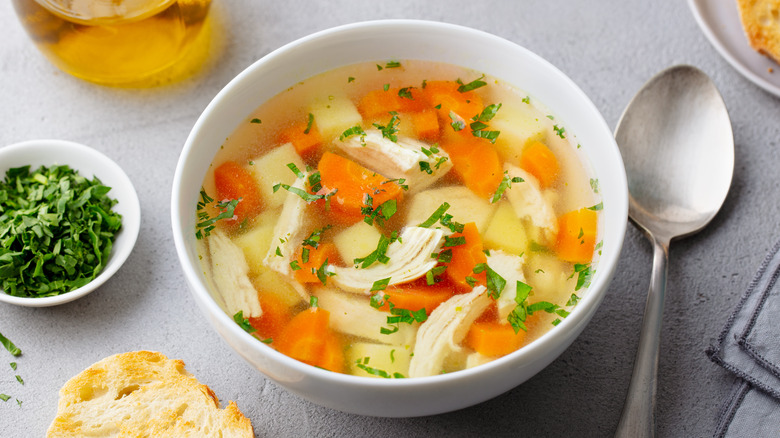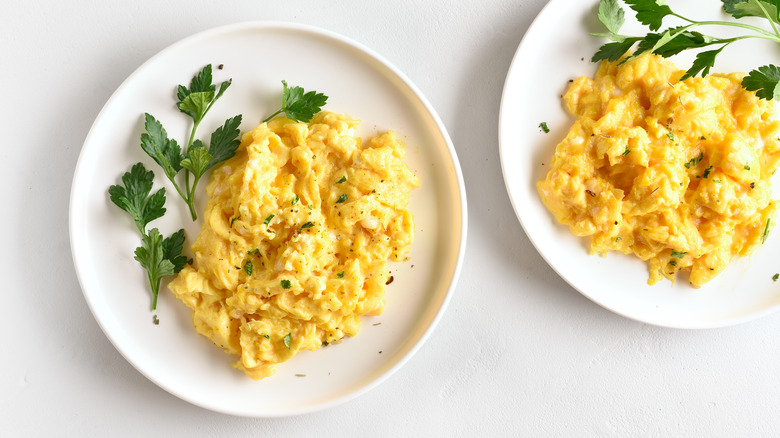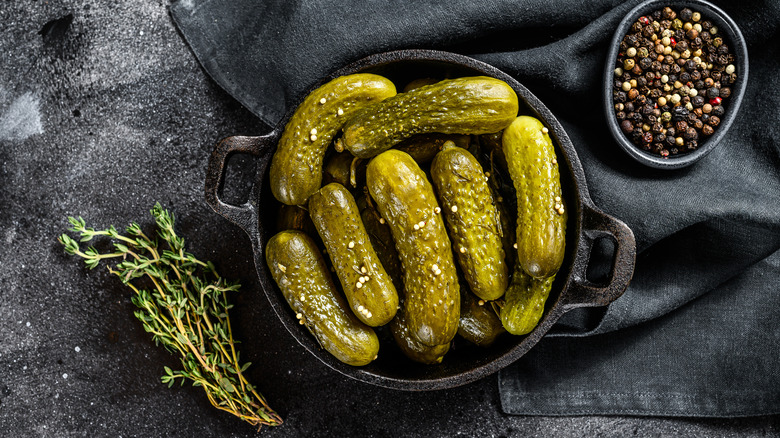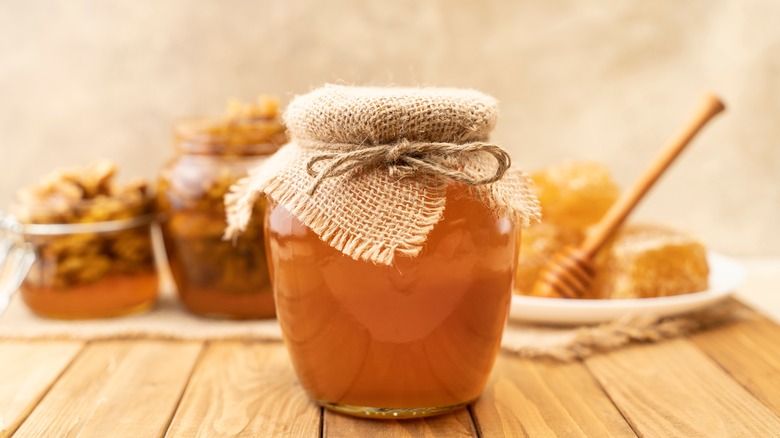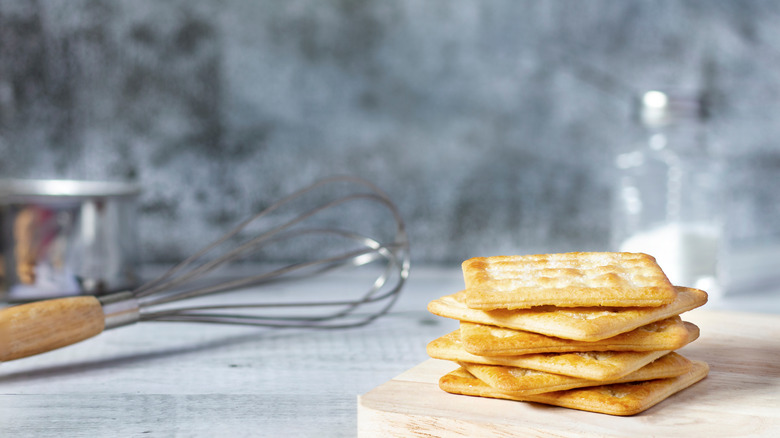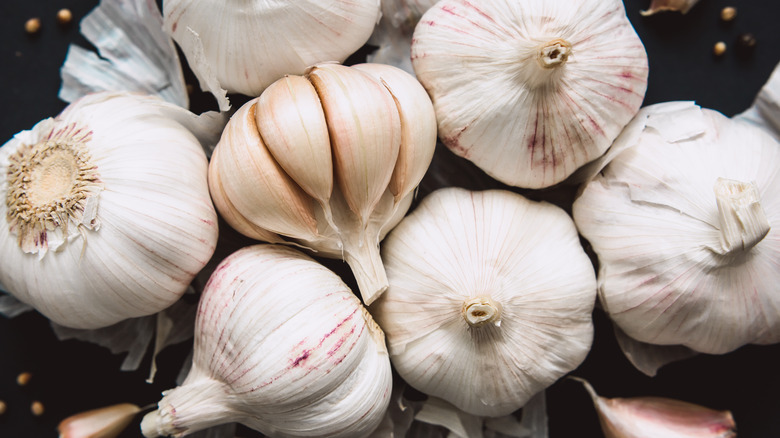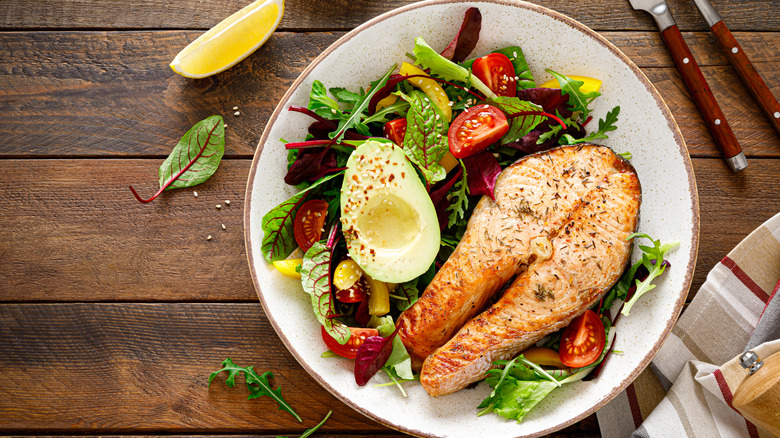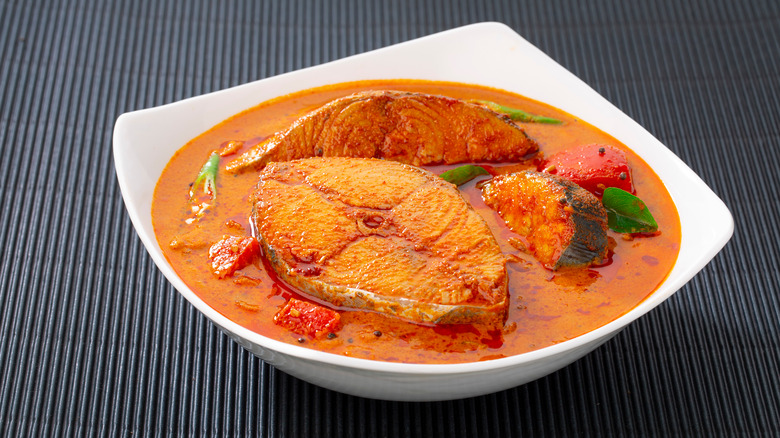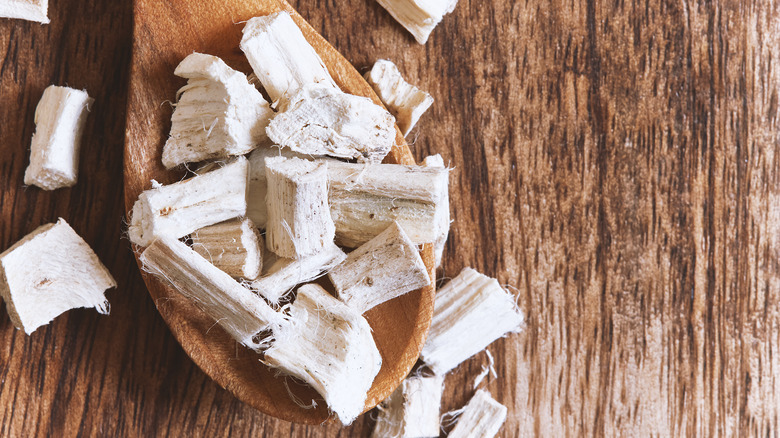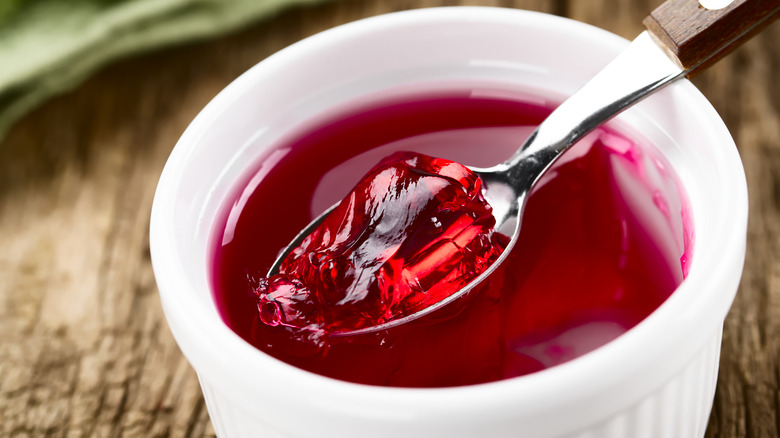7 Foods To Eat And 7 To Avoid When You Have A Sore Throat
We all know the feeling. That slight tickle that you start to notice throughout the day, a little more phlegm all of a sudden, a little trouble swallowing ... you've got a sore throat on the way. Sore throats are one of the most irritating health conditions that we experience, and they're hugely common. Strep throat can affect roughly 11 million people a year in the U.S., per TrustCare, and that's just scratching the surface of other illnesses that cause sore throats, from colds to allergies to tonsillitis (via Family Doctor).
And depending on the severity of your sore throat, you can experience everything from a little hoarseness to pretty unpleasant pain. Because they're so common and usually relatively mild, though, treating them is an at-home job. "For most sore throats, you probably don't need to see a doctor. You can treat it with over-the-counter remedies, take time off from work, and rest," says Harvard Medical School associate professor of medicine Jeffrey A. Linder to WebMD. In addition to easily obtainable medications, what we eat and drink when we have a sore throat can help soothe our pains — or make them even worse. We wanted to figure out once and for all what's on and off the menu when it comes to a sore throat, so join us as we take a look at the best and worst dietary choices.
Eat: chicken soup
Few foods have the supreme status that chicken soup has to cure what ails ya. And when you have a sore throat (or any other cold symptom), this simple meal could be your best option. According to a study published in Chest, chicken soup could aid in easing symptoms of upper respiratory tract infections, including a sore throat, through a slight anti-inflammatory effect observed when ingesting it. This anti-inflammatory action may be a result of several components of the soup, including the compound carnosine (found in chicken), which helps your throat and nose feel more clear, and a few components of the chicken joint tissue, which have anti-inflammatory properties, says registered nutritionist Jo Lewin to BBC Good Food.
Several ingredients in a classic chicken soup recipe, like garlic, onions, and other vegetables, may also boost immunity. The phytonutrients in these can improve your immune response, meaning that you might recover quicker and have to endure your sore throat for less time. And to top it all off, the warming heat of chicken soup may supply a soothing effect to the throat when you drink it, in addition to hydration to keep the throat moist, says Healthline.
Avoid: alcohol
When you're ill, it's generally recommended to avoid alcohol, to avoid taxing your body further and help it recover faster (via Theraflu). But despite this, hot toddies (a mix of honey, lemon, and whisky) have become the go-to treatment for some with a cold (per USA Today). Granted, hot toddies do have some healing properties, with the heat of the drink soothing a sore throat. But as the Academy of Nutrition and Dietetics spokesperson Ginger Hultin told USA Today, "alcohol can irritate the tissues in the throat," and may best be avoided entirely when you're battling that familiar scratchy feeling.
Furthermore, alcohol has other effects that could make it your sore throat's worst enemy. It has a dehydrating effect, as Healthline observes, and can specifically dry out your mouth and throat. This can make your throat feel scratchy, says Medical News Today. Exactly the opposite of what you want when your throat's already sore. Instead of drinking alcohol, focus on staying as hydrated as possible, ideally with warm non-alcoholic drinks that will provide a soothing benefit, like herbal teas (via Healthline). Save the booze for once you're feeling better.
Eat: scrambled eggs
When you're battling a scratchy throat, soft, nutritious foods are a priority. That's why scrambled eggs are a solid option. Scrambled eggs, particularly when not cooked too much or combined with harder foods, are generally soft enough for your throat to bear without any trouble, says Medical News Today. Additionally, their protein content can help your body heal any damaged tissue faster, and the warmth of the food can provide a pain-relieving benefit (via Healthline).
Scrambled eggs are also a great choice, not just for their composition, but for their nutritional qualities. Eggs are an ample source of zinc and vitamin D, which your body will very much appreciate when you're sick. "Zinc and vitamin D are nutrients that are getting lots of attention for immunity, and with good reason — they support a healthy immune system," says registered dietitian nutritionist Dawn Jackson Blatner to Livestrong. Zinc, in particular, has been observed to have a positive and anti-inflammatory effect on immune cells, as seen in research published in Molecular Medicine.
Avoid: pickles
You might think that pickles are a fairly innocuous food to eat when you have a sore throat. After all, what harm can a humble dill pickle do? Well, as it turns out, they might cause you more hassle than you think, thanks to the acidic nature of a pickle that results from the pickling process (via Serious Eats). "Although acidic foods help kill bacteria, they may actually worsen the discomfort with swallowing, as it will irritate the inflammation," says board-certified internal medicine and concierge doctor Ehsan Ali to Byrdie. Pickles also generally have a high sodium content, and consuming salty foods in higher quantities can lead to an increased likelihood of dehydration, which can then exacerbate a sore throat (per Medical News Today).
There's also the texture to consider (via K Health). Although pickles can often be softer, trying to crunch down and swallow a harder pickle can irritate the throat, at a time when it needs softer, easier-to-swallow foods. If you're feeling the burn in your throat, it's worth trying to prioritize foods that are softer in texture and will go down easier, or else trying to chew your food really thoroughly, to minimize the abrasion in your throat when swallowing.
Eat: honey
Honey can sometimes get bad press for being super high in sugar, but it also has a range of health benefits. And in addition to being full of antioxidants and brain-healthy polyphenols, honey can also be used as an effective remedy for a sore throat, as Healthline states. When combined with hot tea and lemon, the honey can provide a calming effect on the throat and other symptoms of upper respiratory tract infections, as a 2021 meta-analysis published in BMJ Evidence-Based Medicine showed.
And certain types of honey may provide even more benefits for a sore throat, and the conditions that cause them. "Modern science has shown Manuka honey to be effective against a variety of infections, both bacterial and viral, including those that cause the common cold, as well as some Strep species," stated "Brave New Medicine" author Cynthia Li to Women's Health. Just remember not to ingest too much honey in one go, as it may have the opposite effect from what you need when you're ill. "In larger doses, [its sugar content] can suppress the immune system from doing its job," Li adds.
Avoid: crackers
In a lot of situations, the relatively bland nature of crackers makes them an ideal food when you're ill, especially when you have an upset stomach (per Everyday Health). But when you have a sore throat, they're best avoided. This is primarily because of the hard nature of crackers. When you eat them, any hard or sharp pieces that haven't been fully chewed can end up scratching your throat as you swallow, making things even more painful, according to K Health.
The same issue can occur with other firm or crunchy foods, with anything from potato chips, rice cakes, and harder cookies resulting in increased irritation in the throat. If you find yourself with nothing but crackers on the menu, make sure to chew them well to decrease the likelihood of irritation. When you're ill, it's also worth trying to seek out crackers (as well as other food products) that are made from whole-wheat flour, instead of white flour. A study published in The American Journal of Clinical Nutrition found that substituting whole grains for refined grains over six weeks increased healthy gut bacteria and immune response in adults — and a stronger immune system will help you recover faster and ward off future illness (per the Centers for Disease Control and Prevention).
Eat: garlic
Garlic has long been used as a remedy for various ailments, with the allium being prescribed throughout history for anything from poor digestion to fatigue, high blood pressure, and high cholesterol (per Medical News Today). And with the advent of modern medicine, it's been found that a lot of these uses aren't just random: Garlic does have some superb potential benefits for health, particularly for a sore throat. Garlic, and raw garlic specifically, can reduce throat pain, and its antiseptic nature means that it can help fight bacteria (via MedicineNet). Raw garlic can also deliver an antiviral effect, with its medicinal properties largely coming from allicin, the compound released when the bulbs are crushed or minced.
To benefit from garlic's healing nature, however, there's the small matter of finding a way to eat it. Taking a slice of garlic and sucking it for around 15 minutes, or chewing on a raw garlic clove, can release the allicin that can help your throat, but be prepared for garlic breath. For a slightly easier method, mince a raw garlic clove and mix it with a little honey or olive oil, or blend it up into a vegetable smoothie. Not only will this make it more palatable, but it'll also be easier to swallow and digest.
Avoid: too much coffee
When we're struggling with the symptoms of a cold but have to get through a long day, coffee often seems like the answer. But the caffeine that we so desperately need to wake us up might also be having some negative repercussions for your sore throat. Coffee, and other drinks containing caffeine, can end up causing more throat pain, due to caffeine's potential irritant effects, says registered dietitian Andy De Santis to Global News. There's also your coffee's potential acidity to consider. Although coffee blends can vary in acid levels (per Healthline), foods and drinks that are more acidic have a greater potential to exacerbate throat pain (via Byrdie).
If the sound of going without your precious cup of coffee until your sore throat is healed sounds a little too torturous, though, it's not all bad news. A moderate amount of coffee can be fine to drink when you're experiencing sore throat symptoms, particularly from strep throat, says Livestrong.
Eat: salmon
We think we'd recommend eating salmon under pretty much any circumstance. Hailed as one of the most nutritious foods out there, salmon is a gold mine of vitamin and mineral content, healthy fats, and protein, says Healthline. And all of those nourishing components pay off when you have a sore throat. As well as containing ample amounts of protein to assist your body in repairing damaged cells and recovering from illness, salmon is also loaded with omega-3 fatty acids. Omega-3s have been found to have anti-inflammatory properties, as seen in a research review published in The Journal of the American College of Nutrition — and the source of many sore throats is an inflamed pharynx (via Mount Sinai). Furthermore, these miracle fats may have a positive supportive effect on your immune cells, as shown in a review found in the International Journal of Molecular Sciences.
To add to salmon's supreme status in the sickness stakes, the fish is also full of vitamin D. Adequate Vitamin D intake has long been associated with maintaining healthy immunity, per an article in the Journal of Investigative Medicine. And if that's not enough, it's also a food that is soft and easy to swallow (most of the time, provided your salmon isn't extra-crispy), which helps your sore throat stay free from unnecessary irritation while you're eating.
Avoid: spicy foods
As anyone who's pushed themselves out of their comfort zone when ordering a burrito with extra spice and then instantly regretted it knows, spicy foods can cause a lot of pain. And when you're already struggling with a throat full of knives, it's probably better to stay on the mild end of the spice scale. Certain types of spices, including heat from chilies and nutmeg, can make your throat feel even more painful, according to Medical News Today. Dousing your food with hot sauce may also have a similar effect.
However, it may not all be bad news when it comes to spice, as some types of spicy food may help your throat feel better. Capsaicin, the active ingredient in many spicy foods that causes their trademark heat, can assist in the dispersion of mucus, which can then reduce throat pain, as Rochester Regional Health discusses. Eating spices can also provide immunity-boosting benefits, with antimicrobials and antioxidants delivered through some spicy foods, according to registered dietitian and "Read It Before You Eat It" author Bonnie Taub-Dix to Women's Health.
Eat: Marshmallow root
Marshmallow root has been used as a herbal treatment for various illnesses for hundreds of years, as Medical News Today discusses. But when it comes to a sore throat, it may be particularly beneficial, as observed in a study published in Frontiers in Pharmacology, which found that the anti-oxidative and anti-inflammatory effects of marshmallow root can help soothe irritated mouth and throat tissue, and potentially reduce coughs that come with sore throats. It does this by "creating a protective coat on the surface of the mouth and throat," says Providence Saint John's Health Center-based laryngologist Omid Mehdizadeh to Bustle.
But! If you hoped that eating marshmallows would have the same effect, we have some bad news for you: "Unfortunately, store-bought marshmallows do not soothe a sore throat," Mehdizadeh adds. Most store-bought bags of marshmallows contain little more than sugar, gelatin, corn syrup, and other flavorings or stabilizing ingredients, according to Chemical & Engineering News. No root in sight, folks.
Avoid: cheese
There's a lot to be said for cheese, in our opinion (the main thing being that it's very, very, very delicious). But if a sore throat has struck, it could be wise to leave it off the menu temporarily. Although cheese is typically heralded for its creamy nature, a lot of cheeses can be slightly acidic, with certain cheeses scoring as low as 4.6 on the pH scale (and interestingly, the lower the pH of cheese is, the less likely it is to melt, says Cheese Science Toolkit). This acidity can make your throat feel even more painful, says K Health.
Eating dairy in larger quantities can also make mucus thicker, which can worsen symptoms of upper respiratory infections, so it may be best avoided (per Mayo Clinic). Smaller amounts of dairy, however, may be tolerable, and indeed may provide relief from painful throat symptoms. A little cold milk or a small amount of frozen yogurt can pacify pain, and drinking milk specifically hasn't been shown to noticeably increase phlegm production, as the Mayo Clinic discusses.
Eat: Jello
Are you looking for more opportunities to eat Jello in your life? We're gonna be honest, we usually are. This is why it's pretty joyous to know that it could be the perfect snack when you're throat's feeling ragged. Few foods can rival Jello in the softness area, and when you have a sore throat, consuming food that's easy to swallow can help keep it free of additional pain (via Healthline).
Plus, refrigerated Jello could provide a relieving effect. "Cold foods can help decrease the activity of the nerve endings in the throat that signal pain, thus reducing pain and improving symptoms," says Kansas-based Rethink Nutrition's owner and registered dietitian Anna Binder McAsey to Eat This, Not That!. Naturally, this isn't limited to just Jello — other soft cold snacks like popsicles, refrigerated yogurts, or even smooth apple sauce could really the spot and provide pain respite. Just bear in mind, however, that a sudden increase in sugar from these items could potentially prolong your illness. It's been observed that rapid spikes in blood sugar can cause your immune system to temporarily become weaker, making it harder to fight off infection, according to Piedmont.
Avoid: orange juice
So, we know this one might raise a few eyebrows. Orange juice, with advertising on every bottle loudly announcing its vitamin C content, is often people's go-to when they feel they're feeling under the weather. But for a sore throat, orange juice may not be the best choice. For people experiencing strep throat, orange juice can cause additional irritation and pain, because of its acid levels that can cause a burning sensation, says Nemours Kids Health. The same rule applies to other fruit juices, most of which are acidic, with cranberry juice having a pH level as low as 2.6, according to Food FAQ.
So what about the vitamin C levels in orange juice? Surely that helps, right? Unfortunately, the jury's still out, especially if your sore throat is due to a common cold. A research review published in the American Journal of Lifestyle Medicine has highlighted the fact that vitamin C's effects on treating cold symptoms, and its larger effect on immune function, are still inconclusive. To fight a sore throat, you may be better off reaching for a zinc supplement, which when taken early on in a cold's progression can reduce the length and severity of symptoms (per the Mayo Clinic).


